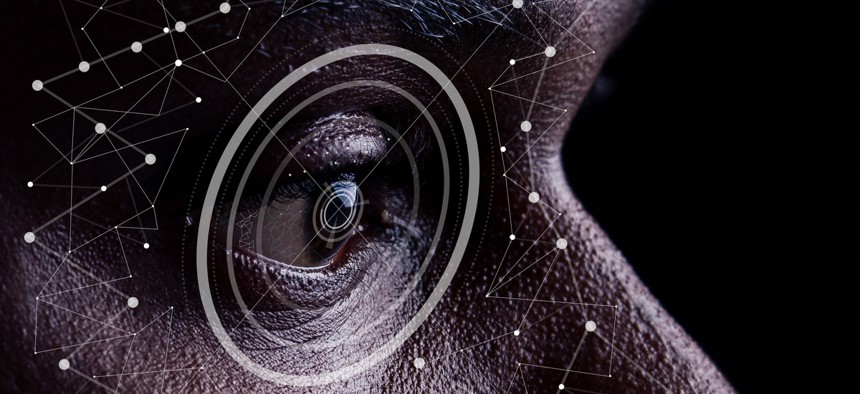DHS Biometrics Proposal Represents ‘Unacceptable Escalation of Government Surveillance,’ Senators Say

yurakrasil/Shutterstock.com
Five senators sent a letter urging the Homeland Security Department to abandon a proposal to expand its biometrics program.
A group of prominent progressive senators is urging the Homeland Security Department to withdraw its proposal to expand the biometric information collection practices of U.S. Citizenship and Immigration Services.
Sens. Ed Markey, D-Mass., Bernie Sanders, I-Vt., Ron Wyden, D-Ore., Elizabeth Warren, D-Mass., and Jeff Merkley, D-Ore., sent a letter to DHS acting Secretary Chad Wolf Friday urging the agency to abandon its biometrics proposal due to privacy concerns, calling biometric data collection “invasive.”
“Expanding biometric-data collection in this manner would chill legal immigration, be inconsistent with our privacy values, and pose disproportionate risks to individuals of color,” the letter reads. “The scope, sensitivity, and invasiveness of the proposed DHS biometric data collection program would amount to an unacceptable escalation of government surveillance.”
USCIS issued a notice of public rulemaking to expand its collection of biometric information in September. The agency allowed a 30-day public comment period, which closed October 13.
Many commenters as well as the five senators said the significance of the rule as well as extra burdens created by the COVID-19 pandemic should have merited a longer comments period. But procedural complaints are the tip of the iceberg on this rule proposal.
The rule proposes expanding the collection of biometric information by allowing USCIS to collect iris scans, face scans, voice prints and palm prints, and to require submission of DNA tests for determining genetic relationships.
This information, should the rule change go through, would be collected from a much wider group of individuals. The rule proposes abolishing age restrictions, which currently protect children under the age of 14 from requirements to submit to biometric information collection. The proposal also says USCIS should be able to collect biometric information from anyone associated with an immigration benefit or request, which could include U.S. citizens who assist immigrants with completing applications.
According to DHS’ own count, these changes would result in an additional 2.17 million new biometric submissions collected annually and a growth in the submitting population from 3.90 million to 6.07 million.
The letter submitted by the senators opposes the substance of the rule and points out past instances wherein DHS failed to protect biometric data as evidence the agency and its components aren’t fit to enact this kind of change.
The senators referenced a September report from the DHS inspector general describing a 2019 data breach where 184,000 photos of travelers from a Customs and Border patrol facial recognition pilot were exposed after a cyberattack. Some of those photos were posted on the dark web.
“A privacy invasion of this nature is particularly harmful because victims of biometric data theft—as opposed to episodes involving credit card numbers or login credentials, for example—cannot easily protect themselves by changing the breached information,” the letter reads.
This group of senators has a track record of opposition to government use of biometric technology. Markey in June introduced a bill into the Senate co-sponsored with the four other signatories of the letter that would halt government use of biometric technology.
The bill, called the Facial Recognition and Biometric Technology Moratorium Act, would prohibit federal agencies and officials from using biometric surveillance systems or using information from such a system operated by another entity without explicit statutory authorization. The bill has mirror legislation moving through the House as well.






